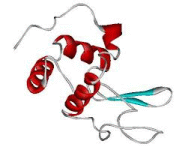| Lysozyme navigation: | Home | Copyright | Contact us | |

|
Lysozome deficient cell has better immunity against Salmonella
published: 22 Nov 2011 (3:47)
 |
| The nematode worm Caenorhabditis elegans. |
The experiment conducted by Dr Robin May of University of Birmingham School of Biosciences consisted of deletion of a gene in C. Elegans which was known to be resistant to a certain fungus. The aftermaths of the experiment were astonishing since the loss of immunity to a fungus resulted in the gain of resistance to the bacteria Salmonella. It can be inferred that the earlier resistance to fungus also came at the cost of vulnerability to some other pathogen.
High above the animal kingdom, such a phenomenon has been witnessed earlier as well but this study indicates that the simpler and smaller organisms like nematodes also go through similar changes in their immune system. The observation of the occurrence of this trade-off in nematodes has further confirmed its importance across the animal kingdom.
Like national defence, the immune system of any organism requires an enormous investment of energy. It also is a liability for its own body since an imbalance would affect the organism badly, as is the case with allergies. For its own sake, an organism has to strike the prefect balance between expenses and outcomes of this energy investment. To manage its limited resources, an animal trades off resistance to one for another.
Researchers deleted a gene called “lys-s”, which produces the immune protector lysozyme. Almost all the lysozymes are known to prevent the occurrence of bacterial diseases. However this type of lysozyme “lys-s” protects an organism against fungal diseases like Cryptococcus Neoformans, a fungus which targets immune-compromised organisms.
Dr Robin May pointed out that the cause of such behaviour of the worm where deleting lysozyme boosts the immunity of the worm against Salmonella. One of thepossibilities might be that there is increased opportunity for and efficiency of other components of the immune system when lysozyme is missing. Another possibility is that the Salmonella may be switching on its defences when lysozyme is present.
The Chief Executive of the BBSRC, Professor Douglas Kell insisted that their work on simple models may provide an insight into the functioning of immune systems across the animal kingdom. He also hoped that his study model would be beneficial for further research in this field. An understanding of the biological phenomenon in nature leads the path for its application in bigger animals and humans. It may even help deal with chronic inflammation and ageing process along with resistance to pesticides by crop plants.
Elizabeth K. Marsh, Maaike C. W. van den Berg, Robin C. May. A Two-Gene Balance Regulates Salmonella Typhimurium Tolerance in the Nematode Caenorhabditis elegans. PLoS ONE, 2011; 6 (3): e16839 DOI: 10.1371/journal.pone.0016839
Other news pages: 1
News
Lysozome deficient cell has better immunity against SalmonellaBy replacing one of the most important soldiers ...
Lysozyme Decrease Diseases Caused by SalmonellaWhen a hen lays an egg, it gives the egg some ...
Other news pages:
1
| Copyright 2006-... by Lysozyme.co.uk |